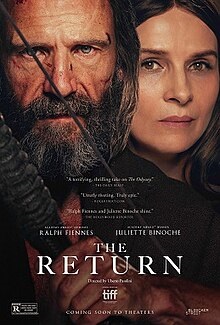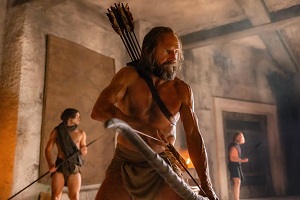The Return, a more Human Odyssey
TORONTO – While almost a third of the world’s population celebrated Christmas last week, a seemingly equal amount of cinephiles, historophiles and antiquarians were sent into a frenzy over Christopher Nolan’s new film announcement – The Odyssey. According to Universal’s statement on X, the British filmmaker’s next project “Is a mythic-action epic shot across the world using brand new IMAX film technology. The film brings Homer’s foundational saga to IMAX film screens for the first time and opens in theaters everywhere on July 17, 2026”.
But before we dive into Nolan’s potential masterpiece, a presumption based on a near spotless filmography, there’s a current film adaptation in theatres about Odysseus’ epic homecoming by an Italian filmmaker, Uberto Pasolini. The Return picks the story up as the battered and weathered King washes ashore on his island, Ithaca, twenty years after his departure. Pasolini’s cunning and erudite King however, played by Ralph Fiennes, is not hampered by the meddling Greek deities that entrench themselves in the lives of Homer’s Ancient Greeks.
The story of The Return strips from the original tale the machinations of the gods, leaving Odysseus “A man dislocated” – as Feinnes puts it. “The psychology of Odysseus is a man I think dislocated, not sure who he is anymore and so that psychology which Uberto put into the text, I really liked”. Fiennes’ performance takes Pasolini’s subtext to heart, as he plays Odysseus with a dimension of shame and regret that arguably wasn’t in Homer’s blueprint.

Pasolini’s humanizing of the characters, specifically Odysseus and his wife Penelope, intends to bring modern audiences closer to the ancient and in some ways alien world, often replete with gods and monsters and mythological symbolism of which only the few are initiated in. When asked about the decision to axe the gods from his script, Pasolini insisted that his focus was on exploring Odysseus’ emotional journey.
“[Capturing] the psychology of being a human, the difficulty of being a good human would be difficult if every action or most actions of our characters were influenced or managed by the gods, as Homer has it in his poem. He was a poet we are just simple storytellers”. In some ways, and this isn’t meant as a disparaging comparison, Pasolini’s The Return shares more in common with Ted Kotcheff’s First Blood (1982) than it does Homer’s oral tale. Odysseus is played by Fiennes as a war vet, consumed with the horrors and moral compromises of his experiences at Troy et cetera. He’s retracted, displaced, depressed and ultimately unwelcomed – a portrait of the stereotypical war vet. Not to mention he’s a one-man killing machine.
The Return, a stripped-down retelling of Homer’s layered masterpiece, is the story about an emotionally beaten man, struggling to recognize and re-integrate into what used to be his home, and kingdom. Juliette Binoche [as Penelope] brings all the anguish of a loyal wife who’s pined and suffered for her husband’s return. From that perspective, Pasolini presents an interesting and thoughtful interpretation, filmed expertly and beautifully – on location in stunning Corfu.
His passion for the film is evident, as Binoche confirms: “Sometimes you have one role in your life or you have one film in your life and it felt very much like it was his major important film. And so when you feel that. Like every single stitch on the cloth or the colour of this and that was so meaningful to him then it just lifts the need of an actor to find inside of you something that’s beyond anecdote, something that’s beyond what’s obvious”
Images courtesy of 01 Distribution

Massimo Volpe is a filmmaker and freelance writer from Toronto: he writes reviews of Italian films/content on Netflix



